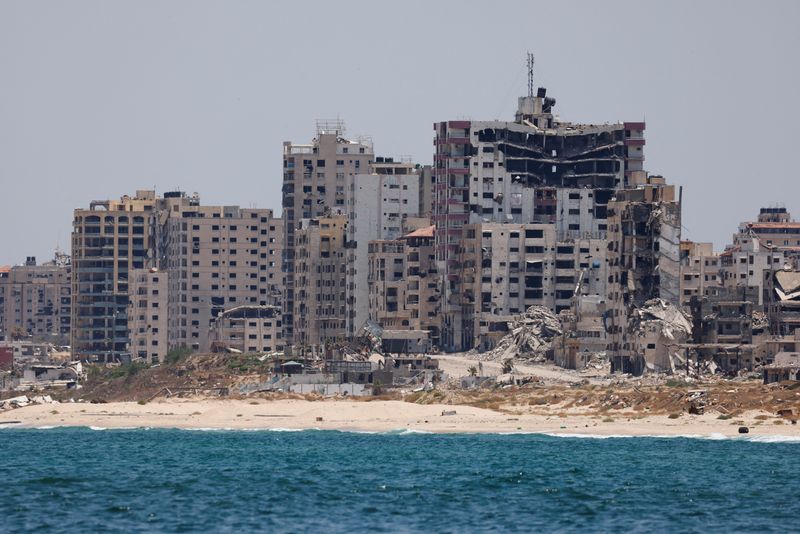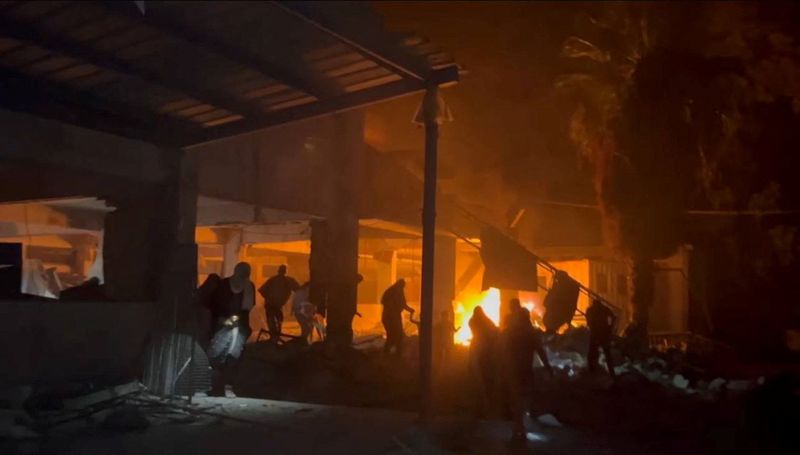By Nidal al-Mughrabi
CAIRO (Reuters) -Israeli forces killed at least 24 Palestinians in three separate airstrikes on Gaza City early on Tuesday and the dead included a sister of Ismail Haniyeh, the chief of militant Islamist group Hamas, Gaza health officials and medics said.
Israeli tanks also pressed deeper overnight into western areas of Rafah in the enclave's south, blowing up homes, residents said.
Two of the Israeli airstrikes hit two schools in Gaza City, killing at least 14 people, medics said. Another strike on a house in the Shati (Beach) camp, one of the Gaza Strip's eight historic refugee camps, killed 10 others.
The house in Shati belonged to the extended family of Hamas political chief Haniyeh, who is based in Qatar. One of his sisters was killed along with other relatives, family members and medics said.
Haniyeh, who leads Hamas diplomacy and is the public face of the group that has run Gaza since 2007, has lost many relatives in Israeli airstrikes since Oct. 7, including three sons.
Responding to the latest Israeli attack that killed his sister, Haniyeh reaffirmed the group's demands for reaching a ceasefire agreement with Israel and said killing relatives would not influence Hamas actions.
"We still maintain that any agreement that does not guarantee a ceasefire and an end to the aggression is not an agreement. Our position on this will not change at any stage," Haniyeh said in a statement.
Hassan Kaskin, a neighbour, said the Haniyeh family house was hit without advance warning before dawn on Tuesday. Footage obtained by Reuters showed the multi-floor building reduced to rubble.
"They were 10 individuals, three of them were scattered outside the house and seven under the rubble - with no prior warning, with people around them, and there are injuries among the neighbours," Kaskin told Reuters.
Israel's military said its forces had targeted militants overnight in Gaza City who had been involved in the planning of attacks on Israel. The militants, it said, included some who had seized hostages as they took part in the Hamas-led cross-border attack on Israel on Oct. 7 last year.
The Israeli Air Force bombed two structures "used by Hamas terrorists in Shati and Daraj Tuffah in the northern Gaza Strip. The terrorists operated inside school compounds that were used by Hamas as a shield for its terrorist activities", the military said in a statement.
Hamas denies using civilian facilities such as schools and hospitals for military purposes.
Separately, the armed wings of Hamas and the allied Islamic Jihad said in a joint statement their fighters had fired mortar bombs overnight against Israeli forces in the Yibna neighbourhood of eastern Rafah.
In the city of Khan Younis to Rafah's north, medics said Israeli tank shelling killed seven Palestinians and wounded several other people at a tent camp in a western district.
Gaza health officials said at least 45 Palestinians had been killed by Israeli military strikes across the densely populated coastal enclave on Tuesday.
The United Nations Palestinian refugee agency (UNRWA) said chaos was taking hold in Gaza as smuggling bands form, adding to the difficulties of delivering sorely needed aid to the territory.
A high risk of famine also persists across the Gaza Strip as the conflict rages on unabated and humanitarian access remains restricted, a global hunger monitor said on Tuesday.
HEZBOLLAH CONFLICT
Over eight months into the war, international mediation backed by the U.S. has failed to yield a ceasefire agreement. Hamas says any deal must bring an end to the war and full Israeli withdrawal from Gaza, while Israel says it will accept only temporary pauses in fighting until Hamas is eradicated.
Israeli Prime Minister Benjamin Netanyahu said on Sunday the phase of intense fighting against Hamas would end "very soon", freeing up more forces for deployment on Israel's northern border with Lebanon, where clashes with Iran-backed Hezbollah have escalated.
Israel's national security adviser Tzachi Hanegbi said on Tuesday it would spend the coming weeks trying to resolve the conflict with Hezbollah and would prefer a diplomatic solution there. Shelling has led to the evacuation of tens of thousands of people on both sides of the Israel-Lebanon border.
Israel's ground and air campaign in Gaza was triggered when Hamas-led militants stormed into southern Israel on Oct. 7, killing around 1,200 people and seizing more than 250 hostages, according to Israeli tallies.
The Israeli offensive in retaliation has so far killed 37,658 people, the Gaza health ministry said on Tuesday, and has left the tiny, heavily built-up Gaza Strip in ruins.
Since early May, ground fighting has focused on Rafah, abutting Egypt on Gaza's southern edge, where around half of the enclave's 2.3 million people had been sheltering after fleeing other areas. Most have since had to flee again.

Gaza's health ministry said on Tuesday that hospitals and medical centres in the enclave were experiencing a severe shortage of medicines and medical supplies due to the continued Israeli offensive, Israel's control and closure of all crossings and its targeting of the health sector in Gaza.
In particularly short supply are medications needed for emergency, anaesthesia, intensive care and operations, the ministry said in a statement.
(Reporting and writing by Nidal al-Mughrabi; additional reporting by Ari Rabinovitch; editing by Gareth Jones, Peter Graff, Sharon Singleton, Mark Heinrich and Deepa Babington)
